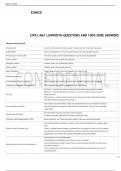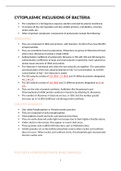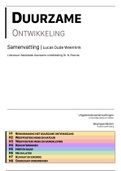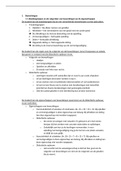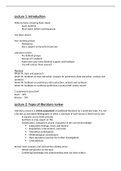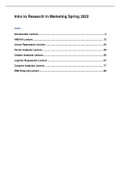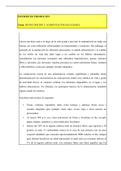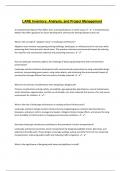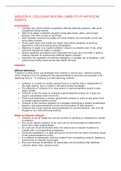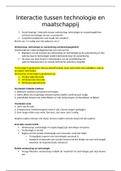10/2/24, 7:09 AM
EUNICE
CIPS L4M1 LO4WIOTH QUESTIONS AND 100% SURE ANSWERS
Terms in this set (24)
private sector A sector of the economy that is owned, financed and run by private individuals
public sector Service organisations, run by the government, and usually funded by taxes
Third sector or not for profit The term usually use for charities NGOs and not-for-profit organisations
Primary sector Industry sector that extracts raw materials
Secondary sector Industry sector that manufactures things
Tertiary sector Industry sector that provide services
open procedure Single stage process, giving any supplier the chance to bid
A two-stage tendering process where suppliers are selected prior to being invited to
Restricted procedure
bid
A competitive dialogue procedure Multi stage process involving feedback from potential suppliers prior to bidding
Competitive procedure with negotiation Multi stage process involving negotiation with the bidders
Economy - minimise the cost of resources used while having regard to quality
Efficiency - relationship between outputs e.g. services and the resources used to
The 3 E's produce them
Effectiveness - extent to which objectives are achieved and the relationship between
intended and actual impacts of a service
Sole traders and partnerships. These are businesses that are not companies because
Unincorporated business they have not gone through the legal steps for incorporation. They are not a separate
legal entity.
Private limited company and public limited company.
Incorporated business
Created a separate legal identity, owners not liable for debt.
Corporate Social Responsibility (CSR) Behave ethically, and I have a positive impact on the environment and society
Have limited liability, meaning of investor, only uses the initial stake if a company goes
bust.
Private Limited Company (Ltd) In law, a private limited company is separate from the people who are on it. It's finances
are separate from their personal finances because the British companies have their own
legal identity. The owners are not personal liable for the thermostats.
Owned by one or more shareholder.
Shared between shareholders, they receive this as a dividend.
Limited companies are able to raise money by borrowing and through the share issue
Advantages of private limited companies
of ordinary shares.
If the company fails, the investors in a limited company are protected by the rules of
limited liability.
1/2
EUNICE
CIPS L4M1 LO4WIOTH QUESTIONS AND 100% SURE ANSWERS
Terms in this set (24)
private sector A sector of the economy that is owned, financed and run by private individuals
public sector Service organisations, run by the government, and usually funded by taxes
Third sector or not for profit The term usually use for charities NGOs and not-for-profit organisations
Primary sector Industry sector that extracts raw materials
Secondary sector Industry sector that manufactures things
Tertiary sector Industry sector that provide services
open procedure Single stage process, giving any supplier the chance to bid
A two-stage tendering process where suppliers are selected prior to being invited to
Restricted procedure
bid
A competitive dialogue procedure Multi stage process involving feedback from potential suppliers prior to bidding
Competitive procedure with negotiation Multi stage process involving negotiation with the bidders
Economy - minimise the cost of resources used while having regard to quality
Efficiency - relationship between outputs e.g. services and the resources used to
The 3 E's produce them
Effectiveness - extent to which objectives are achieved and the relationship between
intended and actual impacts of a service
Sole traders and partnerships. These are businesses that are not companies because
Unincorporated business they have not gone through the legal steps for incorporation. They are not a separate
legal entity.
Private limited company and public limited company.
Incorporated business
Created a separate legal identity, owners not liable for debt.
Corporate Social Responsibility (CSR) Behave ethically, and I have a positive impact on the environment and society
Have limited liability, meaning of investor, only uses the initial stake if a company goes
bust.
Private Limited Company (Ltd) In law, a private limited company is separate from the people who are on it. It's finances
are separate from their personal finances because the British companies have their own
legal identity. The owners are not personal liable for the thermostats.
Owned by one or more shareholder.
Shared between shareholders, they receive this as a dividend.
Limited companies are able to raise money by borrowing and through the share issue
Advantages of private limited companies
of ordinary shares.
If the company fails, the investors in a limited company are protected by the rules of
limited liability.
1/2

